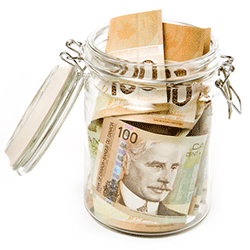 If you intend to pay off your home mortgage as quickly as possible, then you're in the majority; a survey released back in 2008 by the Canada Mortgage and Housing Corporation claims that more than 75 per cent of survey respondents who bought a home in the previous year said being mortgage-free sooner was their goal. This has likely not changed much in the years since.
If you intend to pay off your home mortgage as quickly as possible, then you're in the majority; a survey released back in 2008 by the Canada Mortgage and Housing Corporation claims that more than 75 per cent of survey respondents who bought a home in the previous year said being mortgage-free sooner was their goal. This has likely not changed much in the years since.
Of course wanting to be mortgage-free sooner is easier said than done, but there are some tips that can help you reach your goal quicker.
Make the largest down payment you can afford
Fact is, the more you save for your down payment the less you'll have to pay back; not just in the principal but in interest too.
Make more mortgage payments
There are two ways to go about doing this; both will save you some money along the way but one more so than the other.
Your first option is to pay twice a month (or whatever frequency works best for you) the total you would normally pay on a monthly payment plan. For example, if your monthly mortgage payment is $1,000 you can opt to make two payments a month of $500 each. You're not paying any more than you have to each month, although you will save a bit on interest by making part of your monthly total payment early.
Your second (and more money-saving option) is to pay weekly or bi-weekly accelerated payments in lieu of one monthly payment. Why does this save you money? Well, not only will you save money on interest like you would with the first option, but it's also a way you might not notice that you actually are making a couple of extra payments each year. Let's say for example, your monthly mortgage payment is $1,000 for a total of $12,000 per year. If instead you decide to pay $500 every two weeks, you'll actually end up putting $13,000 a year against your mortgage.
Round up your mortgage payments
Every little bit counts and the more you can pay, the quicker you will pay off your home mortgage. If your payments come out to an odd number round up your payments to a number you are comfortable paying. For example, if your payment is $987 consider rounding it up to $1,000. It's a small enough amount that you likely won't notice but over the long run will help you chip away at your mortgage.
Got a raise, tax return or a bonus?
When possible, view unexpected sources of money as 'found' money and apply it to your mortgage (provided there are no penalties). Since it is money you weren't expecting it likely won't affect your lifestyle in the short-term but will in the long-term when you pay off your mortgage that much faster.
Make anniversary payments
Even if you have a closed mortgage, most home mortgages allow you to make "extra" payments, typically once a year, for up to 20% of the mortgage owed. This money is applied to the principal, saving you money in annual interest costs.
Avoid Prepayment Pain: Check your mortgage agreement for prepayment (e.g. extra payment) conditions. Depending on the type of mortgage you have, you may be subject to penalties. Before making an extra payment find out if there is a fee or penalty, a required minimum amount, a maximum allowed or conditions on when the payment can be made.
Renewing at a lower rate? Keep your payments the same.
If you're able to get a lower interest rate when you renew, avoid the temptation (unless it's necessary) to reduce the amount of your regular payments. Even though you can pay less, by keeping your payments at the level that you've become accustomed to paying, you'll save more in the long run.
Choose a shorter length of time to repay your loan
Look at all your amortization options to see how choosing a 15-year period versus a 20-year period versus a 25-year period will affect your payments and interest costs. Your mortgage payments will be higher, but you'll pay far less interest over the course of the loan. Do this exercise at the end of each mortgage term as what may have worked for you 5 years ago, might not be the best option for you now.
- See how your amortization period affects what you will end up paying with KANETIX.ca's mortgage payment calculator
Explore refinancing
Historically speaking, today's interest rates are low and if you are concerned about the possibility that rates will increase, refinancing your current mortgage now may help you save money in the long run. Basically, it's a good time for homeowners to consider refinancing when:
- Rates are low and the penalty for breaking your mortgage does not exceed the savings available by switching.
- There are additional savings available above and beyond just a lower interest rate. For example, does your current mortgage offer you the flexibility to make lump sum payments, increase your payments or change your amortization period without penalty? If these are features you want but don't currently have without incurring a penalty then you will want to factor this into your refinancing decision as well.
- You have other, high interest debts (like credit cards), that by consolidating into your mortgage will save you money.




